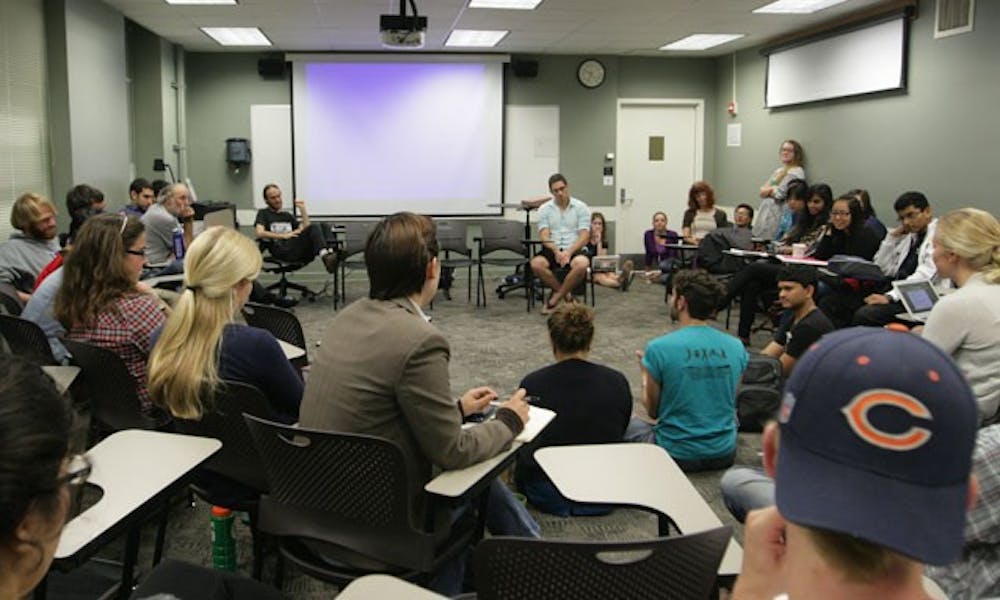A movement protesting the wealth gap in the United States has caught the attention of some Duke students.
About 40 members of the campus group Occupy Duke gathered Wednesday night to discuss ways to show their solidarity with the Occupy Wall Street movement—a network of demonstrations whose goal is to reduce corporations’ influence on government. Their discussion included debate about Occupy Duke’s relationship with Occupy Durham, a similar movement based in the Bull City which rallied Oct 3. The group has used a Facebook page to create a platform and draw support from the student body.
Sophomore Jacob Tobia said he supports radical activism on campus.
“Duke students should occupy the Allen Building with Durhamites,” Tobia said. “Bring the ivory tower down to earth.”
Summer Puente, Trinity ’11 and literacy specialist at the Duke Community Service Center, said students should use this opportunity to connect with Durham.
“Bring [Occupy Wall Street] in locally—fight for the people who serve you food,” Puente said. “It’s really exciting when Duke students do leave campus. Durham doesn’t feel the love [of Duke] very much.”
Duke students should participate actively in the protest to draw attention to the broader movement in Durham and other parts of the country, said Ben Crawford, Music ’11 and Trinity ’02.
“What would be perceived if [passers-by on Duke campus] see Duke—the rich kids’ playground—camp out?” Crawford said. “People [should] camp out here and help deliver food as a support for Occupy Durham.”
Sophomore Maria Benitez said Occupy Duke should remain separate from its Durham counterpart because it wants to advocate its cause to a different target demographic.
“We have easy access to outside speakers who come to Duke, faculties that see the world in economic terms and students that are going to work in Wall Street,” Arias said.
Some attendees said that Duke can at times be a symbol of corporatism.
“Duke is the symbol of power in Durham,” sophomore Sunny Frothingham said. “We can treat Duke as a separate community to reach out to Durham—the real world.”
In addition to discussing whether administrators would permit camping out on Main West Quadrangle in protest and whether Occupy Duke should be integrated with Occupy Durham, the group discussed the general need to further articulate the group’s mission.
“The whole country is watching. We can all point out the problems—but do we offer solutions?” junior Santiago Fernandez-Maldonado said. “This movement’s greatest strength is also its greatest weakness. Its horizontal nature makes it very inclusive and easy to grow, but agreeing on how to come to consensus will be a challenge.”
Other attendees wanted to create a space for dialogue about income disparities and corporate influence than a join in national protests.
“We need a dialogue for those who go to school with reliance upon financial aid,” junior Sunhay You said, “Duke’s role in the system is not transparent anymore.”
Anne Allison, Robert O. Keohane professor of cultural anthropology and professor of women’s studies who attended the meeting, said she remembers the years when college campuses were breeding grounds for social change.
“It’s true that it’s a dead period now,” Allison said. “[What’s happening] is very exciting.”
Sophomore Lucas Spangher—who recently interacted with Occupy Wall Street protesters—said he was concerned about how Occupy Duke could portray Duke in a negative light.
“We are not suffering—we don’t want to be complaining students,” Spangher said.
Michael Munger, professor of political science and economics, said he applauds the efforts of Occupy Duke. He was not present at the meeting Wednesday.
“It’s time that someone started fussing about the way both political parties are bought and paid for by investment firms,” Munger wrote in an email Wednesday. “We have created a system where, instead of investing in real assets, the best investments are in failing banks and nations, because we can all count on the bailout.”
Munger added that he is skeptical of any substantial changes that will come about from Occupy Wall Street movements in the near future.
“At this point, it is too unfocused and too loony. It’s a grab bag do-goodism and sentimentalism,” Munger said. “If it has any effect, it will be to discredit the Left and the Democratic party.”
Get The Chronicle straight to your inbox
Signup for our weekly newsletter. Cancel at any time.

